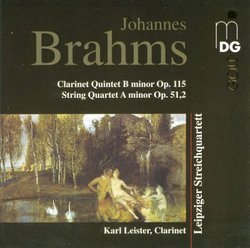| All Artists: Johannes Brahms, Leipziger Streichquartett Title: Brahms: Clarinet Quintet, Op.115, String Quartet, Op.51,2 Members Wishing: 0 Total Copies: 0 Label: MD&G Records Release Date: 1/21/1997 Genre: Classical Styles: Chamber Music, Historical Periods, Classical (c.1770-1830) Number of Discs: 1 SwapaCD Credits: 1 UPC: 760623071923 |
Search - Johannes Brahms, Leipziger Streichquartett :: Brahms: Clarinet Quintet, Op.115, String Quartet, Op.51,2
 | Johannes Brahms, Leipziger Streichquartett Brahms: Clarinet Quintet, Op.115, String Quartet, Op.51,2 Genre: Classical
|
Larger Image |
CD Details |
CD ReviewsSimply the best... 06/01/2006 (5 out of 5 stars) "If a chamber music lover (epecially a clarinetist) was to own only one album, this would be it. The contatsting yet unified Clarinet Quintet, combined with the flawless tone and technique of Karl Leister, and the refined artistry of the Leipzig String Quartet, make this performance simply the best that I have ever heard. Every nuance of the music is brilliantly captured without sacrificing the haunting, dark depth of this piece. The String Quartet in A minor is another great piece of chamber music; the Leipzig Quartet is perfectly seamless in their transition of moods and themes. I only wish they had recorded more! For even more great clarinet music by Brahms, I would suggest purchasing Leister's recording of the Trio, Op. 114, and the two Clarinet Sonatas, Op. 120 on Nimbus Records. Without a doubt, he is the best clarinetist in the world, and you can find no finer recordings of Brahms's late clarinet works than the ones I have mentioned." Leipziger Gold on MD&G... Sébastien Melmoth | Hôtel d'Alsace, PARIS | 06/13/2009 (5 out of 5 stars) ".
(Cover-art by Arnold Böcklin--[the German Gustav Moreau].) . In recent years many newish string quartet ensembles have appeared from various locales around the world featuring younger players fresh out of graduate school--or, indeed, the university faculty members themselves. The musicians are skilled and ofttimes the four players gel enough to realize a quality performance. An adventuresome label (e.g., Naxos) may sometimes issue recordings of calibre and merit by these relatively unknown ensembles. On the other hand, the super-heavyweight professional quartet ensembles currently active are few: there's the Takács, the Emerson, and the Leipziger. (The Alban Berg doesn't seem to be currently active, and the Tokyo concertizes extensively but hasn't recorded much lately.) Withal, the Emerson and the Leipziger seem to be vying for top slot vis-à-vis activity, technique, and repertoire. Both are technically superb. The Emerson has been criticized for brisk tempi and clinical expression--(neither of which are necessarily bad!). The Leipziger had for a time tended to take tepid tempi combined with a cooler countenance--(also not necessarily a bad thing). In recent recordings, both ensembles seem to have balanced-out these artistic quirks to achieve a seamless professionalism--and both have sought out rich, varied, and interesting programmes. ~~~~~~~~~~~~~~~~~~~~~~~~~~~ Featuring the venerable clarinettist Karl Leister, the recordings on this disc of sublime masterpieces are of incomparable quality. It has become passé to note the melancholy autumnal beauty of the dark woody range of the clarinet--especially in the low chalumeau register favoured by Brahms; still, this type of word-sketch symbolises the mood, colour, emotional balance, and ripe reflectiveness of this most exquisite work. There is, after all, something inherently wonderful about the genre of the clarinet quintet in its essential nature of timbre and characteristics, and here on full display is "the marvellous plasticity and harmonic resource of Brahms' late manner." Malcolm MacDonald waxes in writing, "there is a depressive tinge to the music's bone-deep nostalgia, as if the aching beauty keeps something deeper than mere melancholy at bay." Nevertheless, there are rhapsodic episodes of stylized gypsy-music, most notably at the center of the Adagio wherein the near "hallucinatory tranquillity" is broken by the outburst of "a desolately beautiful series of florid clarinet arabesques spiral and swoop over a fantastic string texture of rustling tremolandi. The effect is of wild, spontaneous improvisation, and yet the structural logic is undiminished by these clarinet roulades"--an observation which takes into account Brahms' late organic style of developing variation, just a step away from early-Schönberg. Leister and the Leipziger's performance here (1996) is certainly one of the best on record, making a nice comparison with Gervase de Peyer's 1964 reading with the Melos of London. . The reception history of Brahms' String Quartets has always been somewhat problematic due to the ambiguity of their patrimony: in other words, they're really neither Haydnesque, nor Mozartian, nor Beethovenish. However, this overlooks their most director ancestor: Schubert. In fact, Brahms' three Quartets have more in common with Schubert's c-minor (D.703), a-minor (D.804), and d-minor (D.810) quartets than with any other predecessor. On first audition, Brahms' a-minor String Quartet (Op. 51, No. 2) may seem to be the drab sister of Nos. 1 & 3. However, `tisn't so!--(Pas du tout!). The a-minor Quartet is rather a prime example of the art which conceals art. As such, multiple hearings are required to fully appreciate its closely-worked web of sound and idea--(all the themes are variations of but a single motif--[hello, Schönberg!]). "[In] its intricate and sophisticated motivic organization, the smallest phrases mirror and dovetail into each other." The thrilling dénouement--an highly dramatic Hungarian dash--recalls the Rondo alla Zingarese of the earlier g-minor Piano Quartet. . Mozart and Brahms: Clarinet Quintets Brahms: Sonatas for Clarinet & Piano, Op. 120 Clarinet Quintets Reger: Clarinet Quintet; String Sextet Fuchs: Clarinet Quintet in E flat major; Lachner: Septet in E f flat major Hindemith: Septet; Clarinet Quintet, Op. 30; Octet Coleridge-Taylor: Piano Quintet; Clarinet Quintet Arthur Bliss: Clarinet Quintet; String Quartet No. 2 Antonin Reicha: Clarinet Quintets op 89, 107 (Supraphon) ." |

 Track Listings (8) - Disc #1
Track Listings (8) - Disc #1